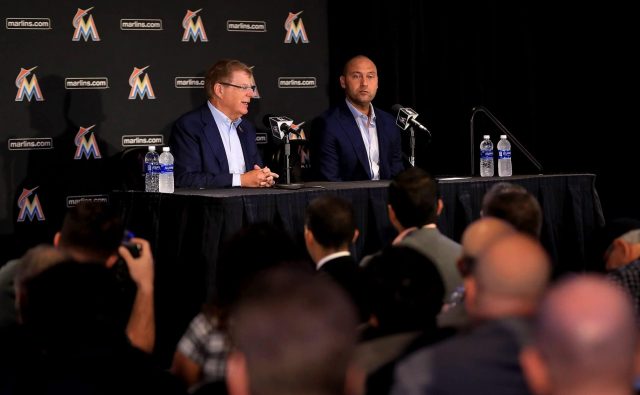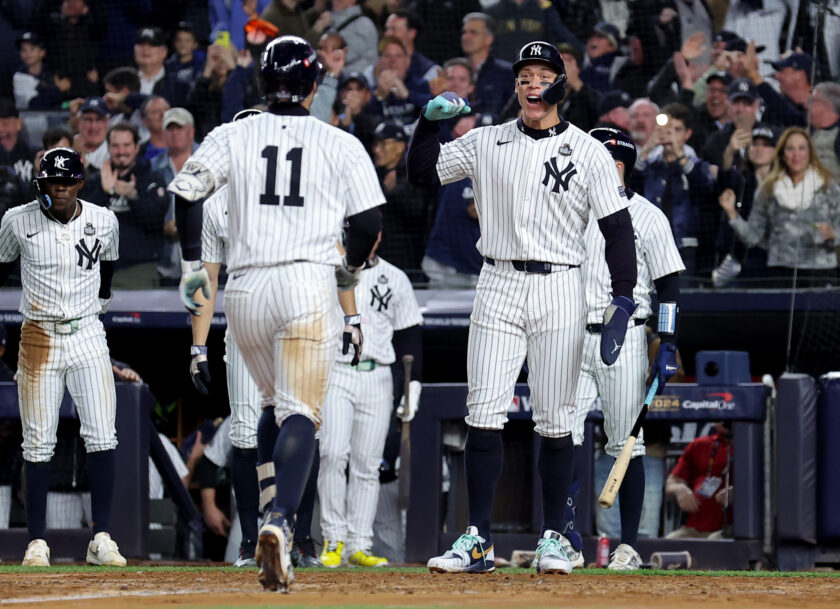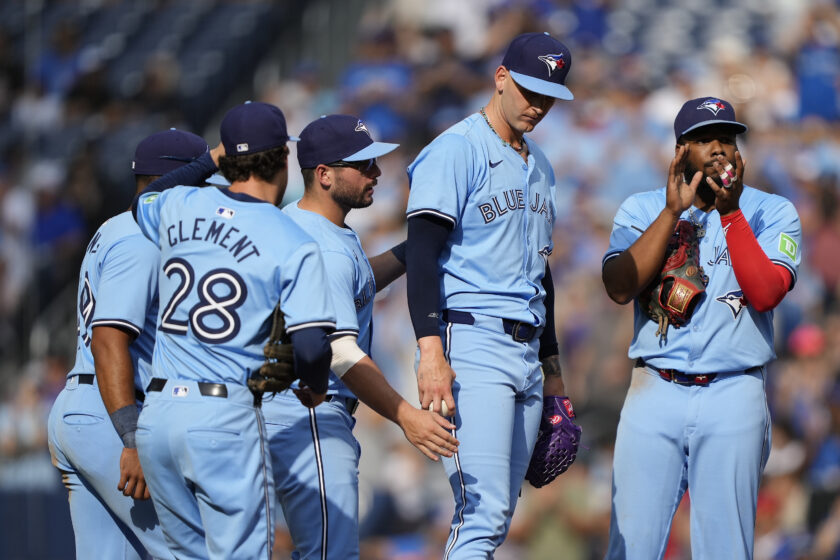MLB: Players swing-and-miss with luxury tax gripes

The Major League Players Association (MLBPA) took another shot at MLB on Friday aimed at how teams handle the luxury tax.
Earlier this week, I took a shot at defending the players and the MLBPA on some issues they are currently objecting to publicly. I stand by that. But the MLBPA wasn’t done with their objections, according to Barry Jackson of the Miami Herald.
“We have raised our concerns regarding both Miami and Pittsburgh with the Commissioner, as is the protocol under the collective bargaining agreement and its revenue sharing provisions,” players union spokesman Greg Bouris told the Miami Herald. “We are waiting to have further dialogue and that will dictate our next steps.”
The nature of the player’s concern is tied to a much repeated, but never fully answered question directed to MLB, as to how teams utilize the money they collect from teams who exceed the salary cap limit. In particular, how much, if any, of those revenues, go to player’s salaries, where the players claim the monies should be invested?
Before we get into the issue behind that issue, though, let’s clarify what the current agreement says about the use of luxury tax funds transferred to teams like the Marlins and Pirates. Directly from the agreement:
“The Commissioner’s Office then redistributes this money in a standard manner. The first $13,000,000 will be used to defray club’s funding obligations from the MLB Players Benefits Agreements. Of the remaining sum, 50% of the remaining proceeds collected for each Contract Year, with accrued interest, will be used to fund the players as described in the MLB Players Benefits Plan Agreements, and the other 50% of the remaining proceeds collected for each contract year, with accrued interest, shall be provided to clubs that did not exceed the Base Tax Threshold in that Contract Year.”
What jumps out from this is the MLBPA is not forthright in claiming that the funds collected by teams are to be used exclusively for player salaries. Regardless, the players might still have a point, except that we’ll never know what the truth is since MLB franchises are still protected from federal anti-trust laws. So, therefore, they are not required to issue annual financial statements to the federal government that could, upon examination, determine the answer to this (very valid) question.
What the players are missing in this, though, is that occasionally you run into a team that is poorly run from a financial standpoint. And because ownership of the team doesn’t have a clue or worse simply doesn’t care since the team they own is just another in the collection of toys they’ve assembled in their garage.
A case in point is Jeffrey Loria, the previous owner of the Miami Marlins, which happens to be one of the teams being brought into question by the MLBPA.
To begin with, anyone owning a major league baseball team in Miami should have their head examined (oh, sorry Mr. Jeter). Florida, perhaps for reasons a sociologist needs to investigate, is not a baseball community. My guess would be the volume of seniors living in the state on fixed incomes, together with the always sunny weather making the beach a more enticing destination is the reason, but in the end it doesn’t matter, and both the Marlins and Tampa Bay Rays surely have their hands full in trying to meet the financial demands of supporting a big league franchise.
But a closer look at the Marlins reveals that MLB lost the opportunity to reel in Loria and the Marlins long ago, and all the MLBPA is seeing (now) are the chickens coming home to roost.
- The exorbitant contract extended to Giancarlo Stanton was ill-advised and unnecessary. It would be like if today the Yankees offered a 10-year contract to Didi Gregorius. Like Stanton, is he a player the Yankees might want to “lock-up” for that period of time? Of course, he is, but would that be a sound financial decision for the Yankees to make at this time.
- Next, the unfavorable TV contract signed by the Marlins. Note: This table highlights only on the two teams in question and, for now, the Pirates are going to get a pass.

Source: FanGraphs.com
What happened here with the Marlins is that Jeffrey Loria made yet another poor business decision by jumping the gun on other teams in what he believed at the time was a steal.
Because a short time later, the upper tier of TV contracts won by teams who waited for a more opportune time looked like this, with even one small market team (Mariners) nearly quadrupling the pittance received by the Marlins.

3) The new ballpark built for the Marlins, again associated with Loria, is a disaster. Mark Byrnes, writing for CityLab.com, explains:
“According to a Miami Herald report published this week, the Marlins’ on-field fire sale has been making it even more difficult for the city to find tenants for 8,500 square feet of retail space inside four city-owned parking garages surrounding the stadium. Two national chains even signed letters of intent, only to back out over concerns of dwindling crowds and foot traffic.
Only one business, a 625-square-foot cigar store, is currently operating inside the retail spaces despite the city’s efforts, and the baseball team may deserve much of the blame.”
Along the same lines, there is concern building about the Atlanta Braves new ballpark that was located in the middle of nowhere with no space to provide an infrastructure of hotels, restaurants, and the like in the immediate area of the baseball venue.
And so, it is a layered tier of errors made by what can, in retrospect, be considered an inept team of owners, led by Jeffrey Loria who descended the Marlins into the abyss Derek Jeter has now inherited.
But when you drill down into the real problem, MLB is the enterprise coming up with egg on its face, and that’s where the players have a right to be attacking. Because the question now should be – where were the suits at MLB when any of the above events were occurring? And why didn’t they corral the errant ways of Loria long before we reached this stage when the player’s object to how Jeter is going to spend the money that is due to the Marlins per the current rules when Jeter is left to only pick up the pieces?
At the moment, baseball indeed should be keeping a close eye on teams like the Pirates and possibly the White Sox and Tigers who are both in a cleaning-house mode.
There’s a fine line between rebuilding and recalculating the bottom line for owners and shareholder for all teams, where a team says, you know what, I’m in this for me, and I haven’t been paid for a while. So, let’s see someone try to stop me from making a few bucks this year.
The New York Mets, for instance, under Jeff Wilpon and his dad have been running the team under the guise of an “oops, we goofed” mentality when they formed an ill-fated relationship with Bernie Madoff that cost them millions. Who’s suffered in the interim and even now? As far as I know, they’re still living a pretty good life, while Mets fans suffer for the Wilpon’s ineptitude as businessmen who can’t seem to come up with a few bucks to sign at least one top-tier free agent, insisting instead it’s easier to cry poverty.
There’s no referee in the game to call flagrant fouls except for MLB itself. The commissioner is owned by the owners, so no help is apt to come from him. What’s left, except for the players? They were closer to the mark in this video…
https://youtu.be/k9JWjf1Hwa8
But not so much with their latest salvo. MLB is like a target lit up in the night, but the MLBPA needs to pick their battles more carefully from here on in. Fans will jump on board, but only if the sweet spot on the target is hit.
[sc name=”Generic Link Next” link=”https://elitesportsny.com/2018/01/27/mlb-time-to-streamline-baseball-hall-of-fame-voting/” text=”It’s time to streamline the MLB Hall of Fame voting process” ]A fan of the Yankees for more than a half-century, the sport of baseball and writing about it is my passion.
Formerly a staff writer for Empire Writes Back, Call To The Pen, and Yanks Go Yard, this opportunity with Elite Sports NY is what I have been looking for.
I also have my own website titled Reflections On New York Baseball.
My day job is teaching inmates at a New York State prison. Happily married with five grandchildren. Living in Catskill, New York.






